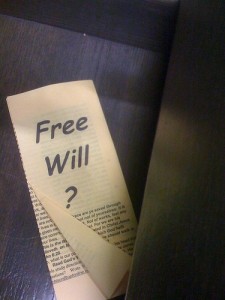An Invisible Barrier to the Exercise of Free Will
 One of the fundamental concepts taught by the Catholic Church is that God gave each of us a “free will” to do whatever we choose to do and that He will not (and does not) force us to do anything.
One of the fundamental concepts taught by the Catholic Church is that God gave each of us a “free will” to do whatever we choose to do and that He will not (and does not) force us to do anything.
Webster’s Dictionary defines “free will” as “freedom of humans to make choices that are not determined by prior causes or by divine intervention.” This definition refers to choices rather than actions which I believe is the correct way to look at the concept of free will.
We are ordinarily judged by our actions… by our behavior… by something we say or do. But what if we do something that has become automatic to us and was not been immediately preceded by a conscious “choice” to do it? For example, because some people have developed the habit of speeding every time they drive, their behavior in operating a vehicle at a speed that is in excess of the speed limit eventually becomes “automatic.” After a certain point in time, every time the person gets into a car to drive, without even thinking, he drives in excess of the speed limit. If a police officer stops him for speeding, in most situations, the driver can honestly say that he had no intention of speeding and wasn’t aware of the fact that he was speeding.
About 15 years ago I had a client who received a ticket for driving under the influence of alcohol (“DUI”) shortly after graduating from High School. His license was suspended for a short period of time and he was allowed by the court to go through the “Dry Roads Program” after which his license was reinstated and he was allowed to drive again. A couple of years later he received another DUI and his license was automatically revoked.
Despite the fact that his license was revoked, he continued to drive his vehicle. To make matters worse, he stole his brother’s driver’s license and used it as his own. He eventually got caught and had to spend time in the county jail. After getting out of jail, he continued to drive without a license and was pulled over on two subsequent occasions.
The last time he was stopped by the police he was intoxicated and was arrested. He called me from the county jail and told me he had a bond hearing scheduled for the following day. I showed up for the bond hearing and, after the hearing, I met with him in a holding cell at the courthouse. We discussed the fact that because of his multiple convictions and his repeated violations of the law, if he wanted me to work out a plea agreement with the prosecutor’s office, he was going to have to agree to spend a substantial amount of time in the county jail.
Prior to calling out to the guard to come and unlock the door of the holding cell so I could get out, I looked at my client and asked him, “Do you think you’ve got an alcohol problem?” He was stunned by my question and blurted out: “What?!” I rephrased the question, “Do you think you’re an alcoholic?” “No!” he said in a defiant tone. I then asked him, “Have you ever thought you might have a problem with alcohol?” Again, he answered “No!” I followed up with this question: “Has Janet ever told you she thinks you have an alcohol problem?” Janet (not her real name) was his live-in girlfriend. At that time they had lived together for over 9 years. (She moved in with him after they both graduated from the
same Catholic high school.)
He answered “No” and told me that Janet had never said anything to him to indicate that she thought he had a drinking problem. I told him that I felt that it was my obligation to tell him that he had a serious drinking problem and that if he ever hoped to get his life back together again, he needed to admit that he had a problem and then seek out the help that he needed. He became angry and defiant and told me I didn’t know what I was talking about.
I didn’t hear from him again until 7 or 8 years later when he called my office and left a message for me to call him. I returned his call and he told me that he wanted to file a lawsuit against his psychiatrist for plotting behind his back to destroy him. I asked him what Janet thought about his situation with the psychiatrist and he told me that she had moved out and no longer communicated with him. His speech was slurred which was an indication to me that he was either drunk or heavily medicated.
I told him there was nothing I could do to help him. He thanked me for taking the time to return his call and hung up the phone. I sat down and said a prayer for him. I haven’t heard from him since.
About 10 years ago, I was assisting a 65 year old Catholic woman with a legal problem and during one of our appointments she told me that her fiancé had recently died. She had tears in her eyes when she told me about his death. I asked her how long she was engaged to him. Her response: “20 years.” She had never been married and expressed regret for putting off the decision to marry her fiancé. I asked her why she never married her fiancé and she said, “He begged me all those years to set a date, but I never felt like I was ready.”
I am convinced that if her fiancé had lived another 10 years she still wouldn’t have followed through on her promise to marry him. Why? Because there was something going on inside of her head that held her back and kept her from making the final commitment. It is my belief that she was incapable of making that final decision; yet she continued to fool herself into thinking that she could (and would) someday actually step up to the alter and say “I do.”
I just told you about two very different people who were each given the gift of a free will by their Creator, but got to a point in their lives where they were literally incapable of changing the course of their lives on their own. Their free will had been neutralized. The man I told you about successfully hid from himself the fact that he had a serious drinking problem, and was therefore incapable of making the commitment to seek out the help he so desperately needed. The woman successfully hid from herself the issues and beliefs that stood in her way of making a final decision to get married, and was therefore incapable of making the commitment to actually schedule a date to marry the man that she loved.
We all have one or more major problems (concerning our spiritual, mental, emotional and/or physical condition) that we have successfully hidden from ourselves by building an invisible barrier that cannot be penetrated – a barrier that we are unable to see because it has been covered up by pride, fear, anger, greed, impurity, false beliefs, the opinions of others, and/or the conditioning we received while we were growing up.
There are only two options available to us that can break through the invisible barriers that hold us back from dealing with our “hidden” problems. Those two options are: (1) intense long-term suffering, or (2) intense long-term prayer. Each of us has the free will to choose and follow through on the prayer option. Unfortunately, failure to choose that option will cause us to automatically default to the suffering option.
I don’t know about you, but I don’t ever want to have to endure intense long-term suffering, so I’ve chosen the intense long-term prayer route. You have a free will to decide whether or not you are going to make a commitment to a lifetime of intense prayer. You can use your free will to make that decision or you can risk your future (here on earth and in eternity) by putting off the decision. Do yourself a favor and take easy way out.


